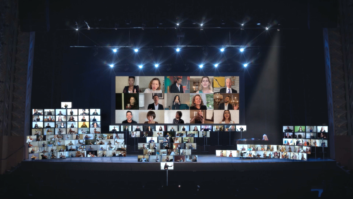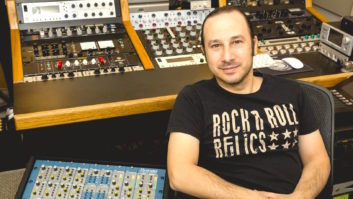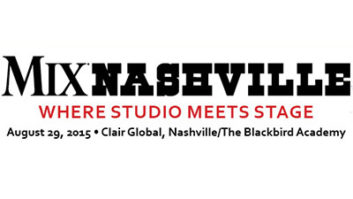The internet has opened up an international marketplace for mastering services, according to Maor Appelbaum of Maor Appelbaum Mastering. LOS ANGELES, CA—The digital revolution in music production has created a truly global market, where audio files can be sent around the world in a matter of minutes, if not seconds. Mastering engineers have certainly benefitted from this transition, attracting clients from all corners of the globe, but that creates certain challenges, particularly regarding communication.

Maor Appelbaum, a native of Israel, has a mastering facility in Los Angeles and deals with clients worldwide on a daily basis, he says. “If we look at the demographics, a lot of my clients are in Europe, in Germany, Spain, Italy, Switzerland and Britain. I was just now on Skype with a client from France. A lot of clients are from Scandinavia—Sweden, Denmark, Finland, Norway. South America is also a big client—Brazil, Argentina, Colombia, Ecuador—and North America—Canada and the U.S.”
English may not be the first language for many of Appelbaum’s clients. Plus, he says, “There is a language barrier even if they know the language. There are things that might get lost in translation.”
Further, he says, “Each country, each place in the world, has its own mentality and way of communicating. Some people like to communicate by email only; some like to communicate by phone or by Skype.”
Communication challenges aren’t limited to the mastering process. These days, even albums are produced through collaborative file-exchange. “I’ve worked on projects where the band has never been in the same place together, but everyone was sending files from one place to another,” he reports. “Some of them were basically done with a hub, one place that gathered all the files and mixed them.”
It doesn’t help that the English language is not particularly useful for describing sound, typically borrowing from the other senses: bright/dark, warm/cold, dry/wet. Plus, sound is subjective: “It’s not uncommon for someone to say to me, ‘I want a dynamic; could you make it really loud and slamming?’ Or, ‘Could you make it really warm and vintage-sounding?’ But there are always going to be misconceptions about what that means, unless you put everybody in the same room, play them sounds and say, this is warm, this is bright, this is open, this is lush. Unless you get a consensus, it’s always going to be hard to decipher what they mean.”
Whatever his clients want, Appelbaum can deliver. “I’ve been adding a lot of gear,” he reports. “I’ve installed a Maselec MTC-1X console, upgraded my Weiss EQ to add dynamics and linear phase, added options to the TC System 6000, added JCF Audio, Dave Hill-designed Titan and Benchmark converters, and a Mutec clock. I have a new pair of Neumann KH310 three-way speakers; those are my near fields now,” he reports. Appelbaum’s main monitors are PMC IB1s driven by a Bryston 4B SST2.
It helps that Appelbaum has built up a good working knowledge of the global music markets over the years. “If it’s a band from a certain territory that is known for certain styles, you’ve got to know about those styles. If you know the styles and what they’re part of, the communication is much more fluent. I think it creates a better connection, and if there’s a need for changes, it’s easier for them to convey their ideas to you.”
Appelbaum’s client list just from the past year is extensive and eclectic, including a lot of English-language artists. Most recently, he mastered CD and DVD versions of Like It Is: Yes Live at the Bristol Hippodrome, featuring the prog rockers performing Going for the One and The Yes Album. He mastered the comeback single from Faith No More, a limited-edition vinyl release.
“Some albums were very successful,” he says. “One is by a band called Starset, mixed by Ben Grosse; that’s very high on the rock and heavy rock charts.” Other jobs have included Ill Nino’s Til Death, La Familia album; Limp Bizkit’s single, “Endless Slaughter;” projects by Butcher Babies, (Hed) Pe, Eric Gales and Norwegian band Mayhem; a single by Pepper featuring New Beat Fund, mixed by Matt Wallace; Archer, produced by Mike Clink; and an all-star Randy Rhoads tribute album.
There are numerous file-transfer services available, web-based and ftp, says Appelbaum, and he’s tried many of them. Even though many services send an email notification that the files have been downloaded, don’t assume anything, he says, and check with the recipient.
“I like WeTransfer—it’s two gigs if you just use the free version, and the cool thing is that you don’t have to register. After I send files, I usually copy and paste the link in an email to the client in case the link got sent to the spam filter.”
As for communication methods, “I’ll use all platforms, but I always prefer it if I can talk with a client. I like Skype because I can send attachments while I’m on there, and also call a phone. I know a lot of people say the best way to reach them is email, but it’s not really the best. People assume that if they’ve sent you a message you’re going to see it, but you shouldn’t assume that.”
Maor Appelbaum Mastering
www.maorappelbaum.com






